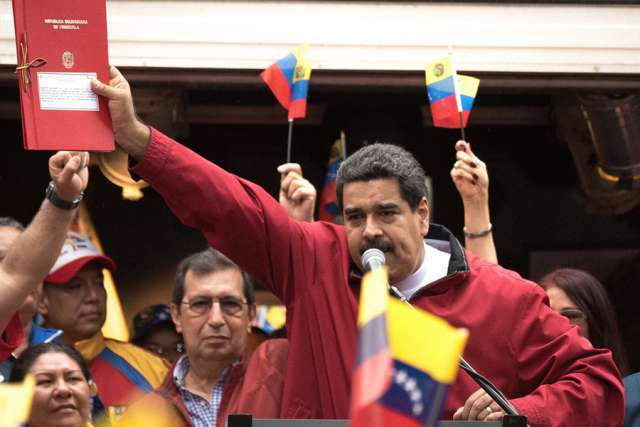The Venezuelan bishops' conference has criticized bias by the National Electoral Council in favor of the government of socialist President Nicolas Maduro during last Sunday's regional elections. The regime took 18 out of 23 disputed governorships, amid allegations of fraud leveled by the opposition. The opposition won five states, an increase of two. It had been expected that the opposition would win a majority of states, given the economic crisis and months of anti-socialist protests in which more than 120 people were killed.
Regional elections were held Oct. 15. The US State Department has said the elections were neither “free nor fair,” citing last-minute changes to polling station locations without public notice, manipulation of ballot layouts, and limited availability of voting machines in opposition neighborhoods.
The 18 newly elected socialist governors were sworn in by the constituent assembly Oct. 19, while the five governors of the opposition Democratic Unity Roundtable boycotted the event. Maduro has said the governors who will not be sworn in by the constituent assembly may not take office. The constituent assembly is itself the product of contested elections, which took place July 30. The body has superseded the authority of the National Assembly, Venezuela's opposition-controlled legislature.
The Venezuelan bishops stated Oct. 19 their denunciation of the National Electoral Council for “ignoring the appeals made by various national and international bodies, has once again shown itself to be a biased arbiter in the service of the governing political party,” the bishops charged in an Oct. 19 statement. Even though Venezuela's constitution indicated regional elections should have been held in October 2016, through the National Electoral Council the government delayed the date of elections. According to various media, this was because the regime feared losing some of the 20 states they controlled, as their United Socialist Party of Venezuela had low approval ratings.
At the same time, protests in recent months had become widespread in the county due to the social and political crisis. In its statement, the bishops' conference pointed out that there were “multiple irregularities committed in the implementation of the electoral process: preventing political organizations from substituting candidates as provided by law, sending voters over to other polling stations at the last minute, the lack of neutral international observers, and voters being pressured into voting a certain way.” “All this constitutes an obstacle to exercising one's right to vote and creates mistrust in the election processes,” they charged.
The bishops also referred to “the decision to create new authorities, preventing from taking office governors elected in those states that did not support the Maduro regime in the elections.” This “is clearly ignoring and mocking the will of the people on which the legitimacy of any election rests,” they stated.
However, despite the irregularities that led to a “pro-regime advantage,” the bishops called on Venezuelans to not lose “credibility and confidence in the power of voting as the way to a peaceful and democratic solution for the urgent and momentous changes that the country requires … We cannot do without the electoral route. Let us not lose hope!” The bishops stated that “it is indispensable to restore justice and ethics to the electoral system” so that citizens “can freely and confidently express themselves” and that in the future, “elections supervised by neutral international bodies may restore peace and tranquility to Venezuelan society.”
The bishops' conference reiterated “the primacy of the individual and his universal rights over and above ideologies, systems of government and special interests.” They called upon “all institutions of social life to respect, defend and promote civil rights and to not become discouraged in claiming them,” and they urged citizens to “not be carried away by irrationality or fanaticism in the political controversy.” “The people have the right to demand that the political leadership concern itself primarily with their most felt necessities, to know and experience them firsthand and to offer to the people a coherent plan for the country, founded on justice and the common good without exclusions,” they said.
The statement concluded asking God to raise up hope in Venezuelans “in face of the serious problems affecting our society, which creates anxiety and discouragement in many hearts.” “We commend ourselves to the powerful intercession of Our Lady of Coromoto and we ask her to watch over us to that we can live in harmony, freedom and peace,” the bishops' conference stated.
Frustration in Venezuela has been building for years due to poor economic policies, including strict price controls coupled with high inflation rates, which have resulted in a severe lack of basic necessities such as toilet paper, milk, flour, diapers, and medicines. Venezuela's socialist government is widely blamed for the crisis. Since 2003, price controls on some 160 products, including cooking oil, soap and flour, have meant that while they are affordable, they fly off store shelves only to be resold on the black market at much higher rates. The International Monetary Fund has forecasted an inflation rate of 2,300 percent in Venezuela in 2018.

